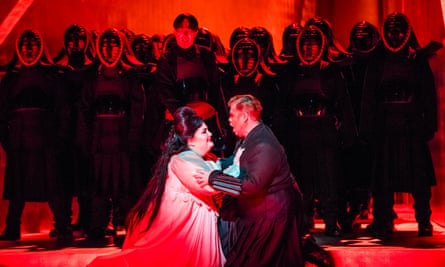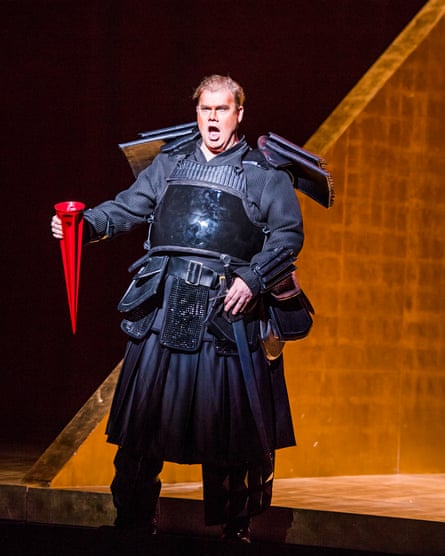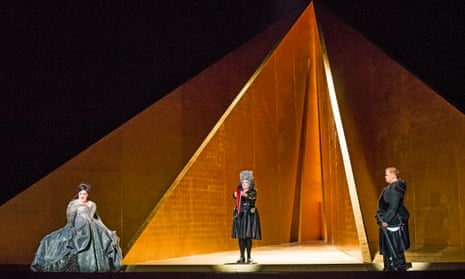In English National Opera’s new Tristan and Isolde the company’s buoyant past confronts its increasingly uncertain future. Edward Gardner, who stepped down as music director a year ago, returns to conduct, while Daniel Kramer, announced in April as the next artistic director at the Coliseum, takes charge of the staging.
Musically, at least, much of the evening is very fine. I doubt there is another tenor around today who could sing the role of Tristan in English (Andrew Porter’s translation) with anything like the authority, sustained beauty of tone and intensity that Stuart Skelton brings to it here, while both Karen Cargill’s compassionate Brangäne and Matthew Rose’s smoothly sonorous King Mark match Skelton for vocal presence.
As Isolde, Heidi Melton began very well, too – the fury of her tirade against Tristan seemed plausibly real. But on the first night she ran out out of steam rather worryingly towards the end of the love duet, and even the final Liebestod was tremulous, almost toneless Sprechgesang at times, not climactic or valedictory in anyway. Gardner’s conducting comes and goes a bit as well, sometimes too measured and careful, so that the dramatic pulse (always slow in this opera) is almost fatally weakened, but sometimes genuinely thrilling; those peaks and troughs might well be evened out, though, as the run goes on.

What won’t be resolved so easily are the problems with the staging, which is confused and illogical, and offers no obvious insights into Wagner’s drama. Certainly Anish Kapoor’s designs don’t help matters. In the first act, the space is divided into three segments with no heed paid to the audience’s sight lines, while much of the action is confined to the front edge of the stage in the other two, though the moon-like object that opens to reveal a beautifully lit grotto for the lovers in the second act is certainly striking.
But the glosses that Kramer adds seem gratuitous. Craig Colclough’s Kurwenal is a Jacobean fop in the first act and some hybrid between Benny Hill and a Beckett clown in the last; Mark’s soldiers are got up like extras from Star Wars in the first act but become paramedics to strap the lovers to hospital beds after the love duet. Blood in general and self-harming in particular (which Isolde initiates barely 20 minutes into the opera) is the overriding theme; it smears across the set from Tristan’s Amfortas-like wound during his final great outburst, which is thrillingly sung by Skelton. He suffers less than others in the cast from the indignities of Christina Cunningham’s costumes, which include some ridiculous wigs and one very silly beard.

Kramer does have one genuinely interesting idea, which he keeps to the last moments of the opera. It would be unfair to reveal it here – there has to be some reward for those who stay with this production for what, dramatically at least, is a very long five and a quarter hours.
- In rep until 9 July. Box office: 020-7845 9300.

Comments (…)
Sign in or create your Guardian account to join the discussion